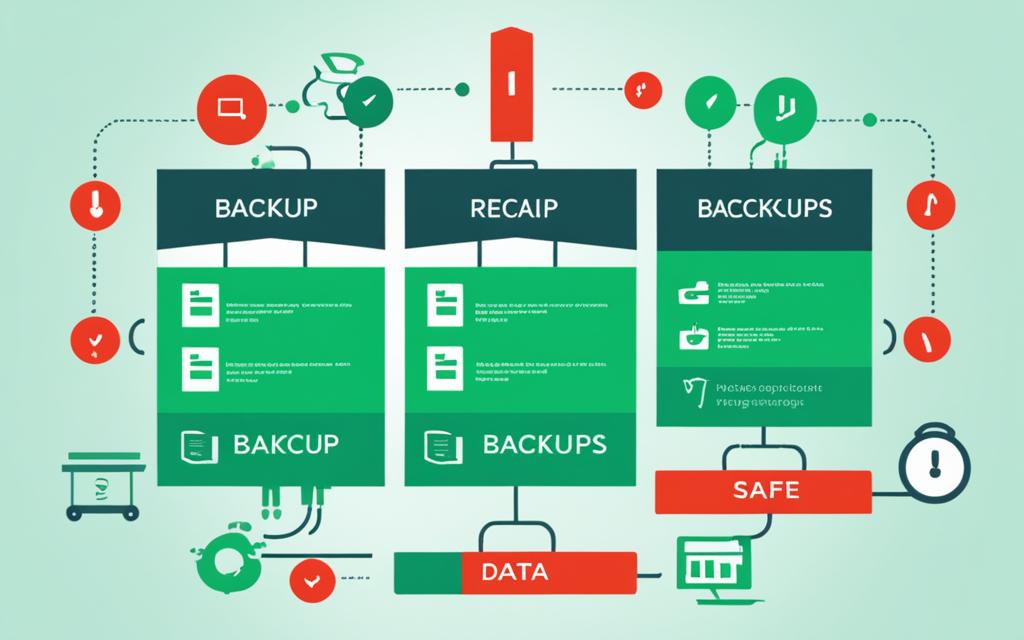The Importance of Regular Backups in Data Loss Prevention
Data loss is a common occurrence that can happen due to various reasons such as hardware failure, human error, malware attacks, or natural disasters. Data backup is crucial to ensure that your data is secure and recoverable in case of any unexpected event.
In today’s digital world, where data is at the heart of business operations, protecting it from loss or corruption is of utmost importance. Regular backups serve as an insurance policy against potential data disasters, providing peace of mind and safeguarding critical information.
By consistently backing up your data, you minimize the risk of losing valuable business information and enable swift recovery in the event of any unforeseen circumstances. Whether it’s customer records, financial data, or essential documents, regular backups ensure that your data remains intact and accessible, even in the face of adversity.
So why are regular backups so vital? Firstly, they protect against hardware failures. Whether it’s a hard drive crash or a server malfunction, having a recent backup allows you to restore your data and resume operations without significant downtime or disruption.
Secondly, regular backups guard against cyber attacks. Malware and ransomware threats are on the rise, with hackers constantly finding new ways to infiltrate systems and hold data hostage. By having up-to-date backups, you can recover your data without succumbing to the demands of cybercriminals.
Additionally, regular backups help maintain business continuity. In the event of a natural disaster, such as a fire or flood, your office infrastructure may be damaged or rendered inoperable. With backups stored off-site or in the cloud, you can swiftly recover your data and resume operations, minimizing the impact on your business.
It is crucial to choose the right backup solution for your business. There are various types of backups, including full backup, incremental backup, differential backup, and continuous data protection (CDP). Each type has its own advantages and storage requirements, allowing you to tailor your backup strategy to meet your specific needs.
Partnering with a Managed Service Provider (MSP) can also play a significant role in data backup. MSPs bring expertise and experience in assessing your business needs, designing customized backup strategies, implementing the right technologies and protocols, and providing ongoing monitoring, maintenance, and support. Working with an MSP ensures that your data backup is in capable hands, allowing you to focus on your core business activities.
In conclusion, regular backups are essential for data loss prevention and maintaining the integrity of your valuable information. By understanding the importance of regular backups, the types of data backup available, and the role of MSPs, you can implement robust data protection measures and safeguard your business against potential data disasters.
Types of Data Backup
When it comes to data backup, there are several types of backup methods that businesses can take advantage of. These methods include full backup, incremental backup, differential backup, and continuous data protection (CDP). Each type offers unique features and benefits, allowing businesses to choose the most suitable option based on their specific needs and requirements.
1. Full Backup:
A full backup, as the name suggests, involves making a complete copy of all data files and storing them in a separate location. This type of backup provides comprehensive protection and ensures that all data is backed up in its entirety. While full backups are time-consuming and require a significant amount of storage space, they offer the advantage of easy data recovery as the entire data set is available.
2. Incremental Backup:
Incremental backups are designed to backup only the changes made to the data since the last full or incremental backup. This backup method is more efficient in terms of storage space usage and backup time, as it only backs up the changed data. However, during the data recovery process, it is essential to have access to both the last full backup and all subsequent incremental backups.
3. Differential Backup:
Differential backups are similar to incremental backups, but instead of backing up only the changes, they back up all the changes made since the last full backup. This means that each differential backup contains all the data that has changed since the last full backup. While this method requires more storage space and longer backup times compared to incremental backups, it simplifies the data recovery process as only the last full backup and the latest differential backup are needed for recovery.
4. Continuous Data Protection (CDP):
Continuous data protection is a real-time backup method that captures every change made to data in real-time or at regular intervals. This type of backup provides the most up-to-date copies of data, ensuring minimal data loss in case of unexpected events. CDP requires specialized software and hardware solutions to constantly monitor and back up data, making it an ideal choice for businesses that cannot afford any data loss.
“Choosing the right backup method depends on factors such as the size of the data, backup storage capacity, recovery time objectives, and budget constraints. Businesses need to carefully evaluate their requirements and choose a backup strategy that aligns with their priorities.”
Storage Requirements Comparison:
| Backup Type | Storage Space | Backup Time | Data Recovery |
|---|---|---|---|
| Full Backup | High | Long | Quick and easy |
| Incremental Backup | Low | Short | Dependent on full backup and subsequent incremental backups |
| Differential Backup | Medium | Medium | Dependent on full backup and latest differential backup |
| Continuous Data Protection | High | N/A | Real-time or near real-time |
Understanding the different types of data backup allows businesses to make informed decisions when it comes to protecting their valuable data. From ensuring comprehensive data recovery with full backups to leveraging efficient storage options with incremental and differential backups, each method offers its own advantages. Additionally, continuous data protection provides real-time backup for minimal data loss. By selecting the most suitable backup method, businesses can mitigate the risk of data loss and safeguard their critical information.
Benefits of Regular Backups
Regular backups are essential for businesses to protect their valuable data and ensure business continuity. By implementing a robust backup strategy, businesses can safeguard their information against hardware failures and cyber attacks, as well as maintain seamless operations even in the face of unexpected events.
Protection Against Hardware Failures
Hardware failures can occur at any time, causing data loss and disrupting business operations. By regularly backing up your data, you can mitigate the risk of data loss and ensure that you have a secure copy of your information stored in a separate location. This enables you to quickly restore your data and resume normal operations, minimizing downtime and potential financial losses.
Guarding Against Cyber Attacks
In today’s digital landscape, businesses face a constant threat of cyber attacks such as ransomware, malware, and data breaches. Regular backups act as a safeguard against these malicious attacks by providing the ability to restore your data to a previous state, effectively neutralizing the impact of an attack. With backups in place, businesses can ensure the integrity and confidentiality of their data, protecting sensitive information and maintaining customer trust.
Maintaining Business Continuity
Unforeseen events such as natural disasters, power outages, or system failures can disrupt business operations and compromise data availability. Regular backups play a crucial role in maintaining business continuity by providing a means to quickly recover and restore critical data. With backups readily available, businesses can minimize the impact of these disruptions and resume operations with minimal downtime.
Choosing the Right Backup Solution
When it comes to backups, choosing the right solution is critical. It’s essential to consider factors such as data size, frequency of backups, storage capabilities, and recovery time objectives. By carefully evaluating your business needs and selecting the most suitable backup solution, you can ensure efficient data protection and streamline the restore process when needed.
Schedule Regular Backups
To reap the benefits of regular backups, businesses need to establish a consistent backup schedule. This ensures that data is continuously backed up at predefined intervals, providing the most up-to-date copies of valuable information. By adhering to a regular backup schedule, businesses can minimize the risk of data loss and ensure quick recovery in the event of any unforeseen events.
| Benefits of Regular Backups |
|---|
| Protection against hardware failures |
| Guarding against cyber attacks |
| Maintaining business continuity |
| Choosing the right backup solution |
| Scheduling regular backups |
The Role of Managed Service Providers (MSPs) in Data Backup
Managed Service Providers (MSPs) play a vital role in data backup by providing expertise and experience, assessing business needs, creating customized backup strategies, implementing technologies and protocols, offering monitoring and maintenance, and providing ongoing support and optimization. Working with an MSP can help businesses ensure reliable and efficient data backup solutions.
When it comes to data backup, businesses need professionals who have the knowledge and skills to manage the process effectively. MSPs have years of experience in the industry and the expertise to assess a company’s unique requirements. By thoroughly evaluating the business needs, MSPs can design and implement customized backup strategies that align with specific goals and ensure data protection.
MSPs leverage their technical prowess to implement the latest technologies and protocols for data backup. They stay up-to-date with industry advancements and can recommend the most efficient and secure solutions for each business. Whether it’s implementing cloud-based backup systems or utilizing on-premise servers, MSPs tailor the backup infrastructure to suit the organization’s requirements.
Monitoring and maintenance are crucial aspects of data backup operations. MSPs continuously monitor backup systems to ensure their proper functioning and identify any potential issues. This proactive approach allows for prompt troubleshooting and minimizes the risk of data loss. Additionally, MSPs perform regular maintenance tasks, such as software updates and hardware optimization, to keep the backup systems performing at their best.
Once the backup systems are in place, ongoing support is vital for businesses to have peace of mind. MSPs provide responsive support, addressing any concerns or issues that may arise during the backup process. Their technical expertise allows for efficient problem resolution, minimizing downtime and maximizing data recovery capabilities.
Furthermore, as technology evolves, MSPs can optimize backup strategies to adapt to the changing needs of the business. They stay informed about emerging trends and make necessary adjustments to ensure the most effective backup solutions. By continually optimizing the backup process, MSPs enable businesses to leverage technological advancements and enhance data protection.
Partnering with an MSP is a strategic choice for businesses that value reliable and efficient data backup solutions. By outsourcing data backup management to experienced professionals, organizations can focus on their core operations while having the peace of mind that their data is secure and recoverable in case of any unexpected events.
| Benefits of MSPs in Data Backup: |
|---|
| Expertise and experience in data backup operations |
| Customized backup strategies tailored to business needs |
| Implementation of advanced technologies and protocols |
| Ongoing monitoring and maintenance for optimal performance |
| Responsive support for prompt issue resolution |
| Continuous optimization of backup strategies |
Conclusion
Regular backups play a crucial role in preventing data loss and protecting valuable information. By understanding the different types of data backup and the benefits of implementing a regular backup strategy, businesses can ensure the safety and recoverability of their data.
Partnering with a Managed Service Provider (MSP) adds another layer of expertise and support to the backup process. MSPs bring their knowledge and experience to assess business needs, create customized backup strategies, implement the right technologies and protocols, and offer ongoing monitoring and maintenance.
Choosing the appropriate backup solution is essential for effective data protection. Businesses should carefully evaluate their requirements and select a solution that aligns with their specific needs. Whether it’s full backups, incremental backups, differential backups, or continuous data protection (CDP), the chosen solution should provide the necessary security and efficiency.
By adopting a comprehensive data backup strategy and collaborating with an MSP, businesses can optimize their backup and recovery processes, minimize the risk of data loss, and ensure business continuity. Safeguarding valuable data is never a one-size-fits-all approach, but with the right backup solutions and partnerships, organizations can confidently protect their data assets.












